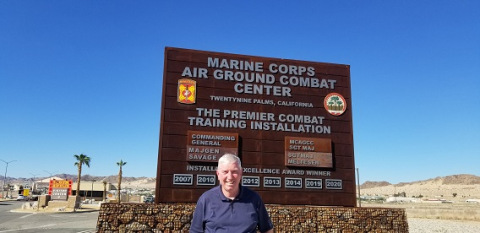Mesothelioma Survivor Talks Life After Decortication Surgery

Fact Checked | Written by: Travis Rodgers | Last Update: 10/24/2024 | 4 Min Read
Kevin Hession underwent surgery to remove all visible mesothelioma tumors in January 2022, about 5 months after being diagnosed with pleural mesothelioma. Sometimes to remove the maximum amount of cancerous tissue the affected lung is scraped, which can cause scarring.
This surgery is called decortication, but is also known as a visceral pleurectomy. Kevin spoke with The Mesothelioma Center, sharing his experiences recovering from surgery. He explains that there are some lasting effects.
“There is a lot of scar tissue around my left lung where they did a lot of work,” Kevin tells us. “Looking at it from the CT scans you can see the scar tissue and it kind of surrounds the left lung.”
While he says he can do most things without a problem, the scarring from his mesothelioma surgery does make expanding his left lung challenging. He says when he overexerts himself, his left lung tries to expand, causing shortness of breath. Kevin explains he balances keeping active with respecting his body’s need for a break.
Staying in Touch With How Your Body Is Feeling
“I can do all of these things that on the surface appear to be quite normal and I feel very, very good about that,” Kevin says. “But when I’m tired, I just slow down and I don’t apologize for that. Almost any time I want to take a nap, I take a nap. That’s important for people to understand.”
He says the key is to be aware of how you’re feeling. In addition to fatigue, there are some distinct physical effects he feels since his surgery.
“The scar tissue doesn’t want the left lung to expand,” Kevin says. “It’s almost like a cone around the left lung. I call it my constant companion. I’m constantly aware that there’s an issue on my left side. It doesn’t hurt. It’s more just uncomfortable.”
Kevin describes feeling a tangible tightness. It can impact his range of motion.
“Imagine a trash bag tied really tightly around a balloon or a straitjacket on my left side,” he describes. “When I lift my left arm to a certain point, I have to force it. It doesn’t hurt. It feels like a resistant tugging as I raise my left hand toward the ceiling.”
Yet, he says he goes to the gym, walks his dogs during the day and goes grocery shopping. He engages in regular exercise.
“I walk somewhere right around 3 to 5 miles,” he Kevin notes. “I can go do all the family grocery shopping, walk around the warehouse, pick up all the stuff, put it in the trunk, drive home, bring it in the house, unload it and put it where it needs to go.”
Keeping a Daily Routine Is Important
Kevin encourages everyone diagnosed with mesothelioma to have a daily routine. He says it helps ensure that they don’t forget to live life despite the disease.
“I think a routine is very important for people who have mesothelioma,” he emphasizes. “It helps you feel like you’re still normal, but with an issue you have to deal with.”
People’s experiences are unique, with some feeling the effects after surgery to different degrees. But he urges people to keep active.
“They need to make the most of their opportunity,” Kevin advises. “Get out amongst people. Feel normal. Feel like there’s a reason to exist.”
Kevin shares his own motivation. “When it’s time to do things like volunteer – and that’s why I get out – it gets me meeting people and it gives me a sense of normalcy,” he says.





